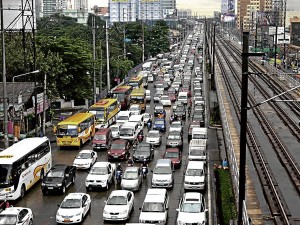‘Telecommuting’ proposed as solution to traffic woes
MANILA, Philippines – Senator Pia Cayetano has filed a bill proposing to institutionalize telecommuting – working online from home – to help decongest the country’s busiest thoroughfares such as those in Metro Manila.
Before anyone gets the idea that Senate Bill 56 promotes laziness, it actually proposes that a “sustainable transport action plan” be devised to promote walking, cycling and the use of improved public transport systems to go to and from school and the workplace.
“The heavy reliance on motor vehicles/cars promotes an unhealthy lifestyle as the public has become sedentary, refusing to walk or bike even short distances,” Cayetano said in an explanatory note to her bill.
This has been causing terrible traffic congestion, unnecessary stress and even accidents in practically all of the major cities in the country, said Cayetano, who is reportedly eyeing one of the top leadership positions in the Senate.
“It is high time we revisit this way of thinking and lifestyle or else our environment and health [will] continue to suffer,” she said.
The bill proposes that the Department of Transportation and Communication and the National Economic Development Authority come up with a sustainable transport action plan as a guide for the planning and design of national and local transportation systems across the country.
“The sustainable transport action plan shall include strategies, relating to parking, public transport, cycling, walking and transport infrastructure, and will set out the actions required to achieve the mode shift target over a certain period of time as identified by DOTC and Neda,” it said.
“The DOTC shall provide guidelines that will promote a shift towards public transportation as a primary mobility option to the general public within 12 months from the effectivity of this act,” it said.
The Cayetano bill also provides for three-meter-wide sidewalks along primary and secondary roads for safe pedestrian passage and convenient use of wheelchairs and strollers.
It also provides for bike lanes “for the preferential or exclusive use of bicycles” in a portion roadways or highways.
Cayetano proposes that better public transportation initiatives be studied and implemented “to reduce the impact of the declining oil economy on our environment and financial markets as well as help reduce energy costs, pollution and even urban poverty.”
The bill provides for the commissioning of a Bus Rapid Transit System, which will organize buses into “one efficient long-distance transportation system with coordinated schedules, rates, routes and pick-up and drop-off points.”
Under this system, private sector stakeholders like mall owners and bus company owners can be tapped to make available parks, parking lots and bus depots for use as a collective terminal “where people can park their cars and bikes and take the buses to their destinations.”
The bill also provides that the government explore the establishment of a ferry system in navigable bodies of water, as well as consider the possibility of interconnecting these waterways.
The bill also provides for an inter-agency study of travel demand management programs by the DOTC and the labor, education and trade and industry departments, which would “come up with guidelines on travel demand management programs that will reduce the volume of cars and motorized transport in the roads… and encourage students and workers to use the public transport system”.
Telecommuting is one of the measures that will be studied to minimize the number of cars on the road.
The others are car-pooling, flexible work schedules or working from satellite work centers, transport programs for government employees and environment-friendly transportation systems certified by the Department of Environment and Natural Resources to reduce greenhouse gas emissions.
